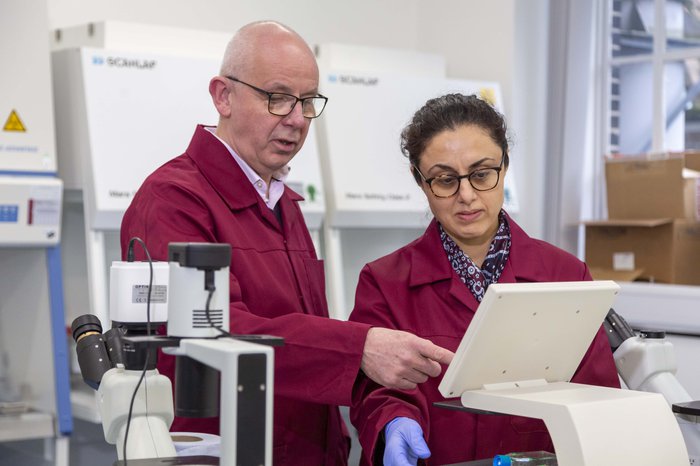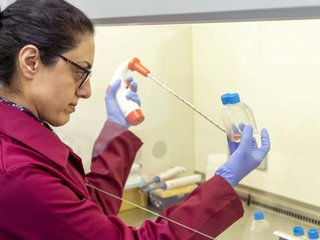Our research strategy: your questions answered
We asked our community what they wanted to know about our research strategy and the future of blood cancer research. In this article we answer these important questions – from how we allocate funding, to how soon research should deliver impact for patients.

Siân Morgan is the Research Strategy Programme Manager at Blood Cancer UK.
What is a research strategy?
In its simplest form, a strategy is a plan of action designed to achieve a long-term or overall goal. In June 2021 Blood Cancer UK launched a new research strategy that aims to accelerates the rate of research progress so that we can beat blood cancer sooner.
We believe we can beat blood cancer within a generation. Here’s how we’ll do it.
Why has Blood Cancer UK created this plan and why now?
We have a long history of investing in blood cancer research and the projects we’re currently funding add up to roughly £40 million. This includes funding for research projects in the lab, Cell Banks which store blood and spinal fluid samples from people with blood cancer, and clinical trials. The research we have funded over the last 60 years has led to developments in our understanding of blood cancers, but we know that we need to do more if we’re going to beat blood cancer within a generation.
Identifying key changes involved in the development and growth of cancerous cells in the last few years has had a real impact on how blood cancers are diagnosed and treated. Recent advances in technology mean we can now better analyse, understand, and build on previous scientific discoveries, providing a platform for the acceleration of new treatments.
Through the development of the research strategy, we have identified areas of scientific opportunity where our focused investment will further accelerate research progress. This will also enable us to develop partnerships, so that we can ensure the best possible outcomes for people with blood cancer.
What proportion of the money that Blood Cancer UK raises will be spent on research?
We expect to fund a minimum of £25 million in research over the next five years and further growth in our fundraising, will increase this total. For this year, our current planned research spend is £5 million, and you can always find out more about our historic spend in our annual reports.
How often do you award funding?
The frequency of how often we fund research depends on how much money Blood Cancer UK raises. The more funds that are raised, the more money we can put into research.
Historically we had two large grant award rounds per year (and sometimes even three), however last year, due to the impact of the pandemic, this dropped to one round, although we hope we’ll be able to award more funding again in the future.
We also award funding for specific projects that align very closely with our strategic aims.
How long does each research project last and how much does each project cost?
A lab-based research project can last between 6 months to 3 years and researchers can apply for up to £250,000. We have a panel of experts who review our grants to make sure the money that has been requested is justified. This helps us make sure that every penny we spend takes us one step closer to beating blood cancer.
How do you decide which research projects to fund?
We have a panel of experts in the field of blood cancer who assess and score each application we receive. Once they’ve done this, they then make a recommendation on which projects should be funded. This year we will have a group of people affected by blood cancer also providing feedback on the applications we received, and we are really excited to get people directly affected by the disease involved.
This year we have also introduced some key priority areas, and asked researchers to submit projects that aim to answer questions in these areas.
Our priorities for this year are:
- Improving understanding of fundamental disease processes - including underlying areas such as disease origin, transformation, and relapse, so that we can better predict, and in the future prevent, blood cancer.
- Improving treatment options for the individual - including personalised approaches and immunotherapies, resulting in improved survival with fewer side effects (due to less toxic treatments).
- Developing novel approaches to the use of data - advancing our understanding through analysing large and rich data sets to facilitate benefits across blood cancers
What are you doing to ensure you support the next generation of blood cancer researchers?
We’ve been funding early career researchers for many years, and in the coming years, we plan to introduce a new fellowship scheme. A fellowship allows individual researchers to take the next step in their career. For example, a fellowship might award funds to a researcher to set up their own lab which will focus on an innovative area of blood cancer research.
What research has been done looking at how we prevent blood cancer?
We have a specific page discussing ‘What causes blood cancer?’, but ultimately in nearly all cases we don’t know exactly what causes blood cancer. And because we don’t know what causes blood cancer, we can’t prevent it.
This is why one of our key priorities in our research strategy is “Improving understanding of fundamental disease processes - including underlying areas such as disease origin, transformation, and relapse, so that we can better predict, and in the future prevent, blood cancer.”
One of our researchers George Vassiliou, Professor of Haematological Medicine at the University of Cambridge spoken about his work in this area in a recent video and is looking to move closer to ‘prevention’.
How long does the research you fund take to have an impact on patients?
That’s a hard question to answer! All the research we fund informs further research in the future. Ultimately every project we fund is another piece of the puzzle solved. Even when we don’t get the results we want to and an avenue is closed, it means scientists know to stop researching this area so they can focus on other promising areas of research.
A lot of the research we fund is lab based and so can take many years to reach patients. Before anything gets to clinic it needs to go through rigorous testing in pre-clinical and clinical trials. Developing new drugs and treatments can be a long process, and can take around 10 – 15 years, because they must be properly tested, to make sure they are safe for people. If a new drug for example isn’t better than the current way of treating people then it won’t get adopted as the new standard of care.
Do we put more money into the diseases which are more common? How is research funding split?
We originally started out as the ‘Leukemia Research Fund’ in 1960, so perhaps unsurprisingly over our 60-year history we’ve funded more work into leukemias than other blood cancers but in our recent history, there has been a spread of investment across blood cancers.
Before the development of our research strategy, we funded the best and most innovative research that was likely to bring the biggest impact to people affected by blood cancer. We’ll still do this, but our research strategy has focused our investment so we can really accelerate progress across all disease types.

Because research will beat blood cancer
Over 60 years, we've invested more than £500 million in blood cancer research which has led to a long line of breakthroughs that have improved treatments and saved lives.
